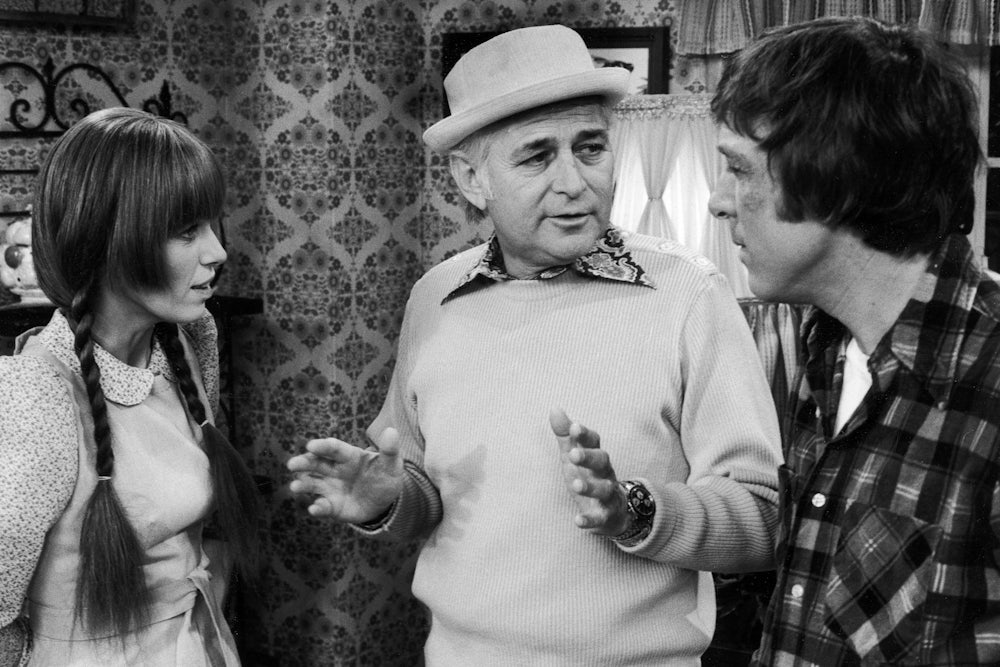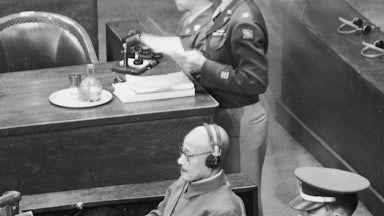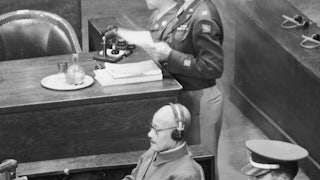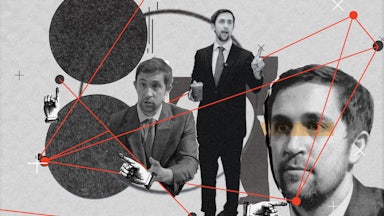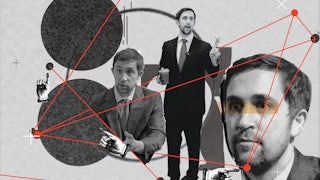Democracy, as Walt Whitman and Woody Guthrie understood, is a feeling. We subscribe to the idea of democracy when we feel connected to and indebted to our neighbours and fellow citizens—the broader that collection the better. The feeling is essential: Without the emotional resonance, democracy can be a boring and frustrating collection of rules and processes that only incrementally delivers the promise of a profoundly better life.
Norman Lear, who died earlier this week at the age of 101, understood laughter as a way of binding citizens of a democracy together. By producing some of the most successful (and still funny) situation comedies in television history, like All in the Family, Maude, The Jeffersons, Good Times, and Sanford and Sons, Lear filled America’s television screens with lovable yet flawed characters animated by sharp writing and top-rate acting. Lear persuaded successful movie actors like Jean Stapleton and Carroll O’Connor and legendary stage performers like Redd Foxx to lend their talents to what was then considered a far less distinguished medium, network television. He asked them to do important work through the channel that would reach the most people of the widest variety.
Almost instantly, with the debut of All in the Family in 1971, Sanford and Son in 1972, and Maude in 1972, Lear changed the look, sound, and feel of American living rooms. Few others before or since—notably Lear’s hero Franklin Roosevelt using his radio addresses—have been able to do that. That he did so in the service of joy, rather than indignation, set Lear apart from another televisual genius of the same era, former Mike Douglas Show producer Roger Ailes. Ailes, although 20 years younger, was the anti-Lear, committed to sucking the goodwill out of the American living room and replacing it with fear, rendering deep, respectful conversation almost impossible for millions of awkward family holidays. Ailes in recent decades did much to undo Lear’s efforts to spark a resurgence and deepening of faith in the American project. It remains to be seen which of them will have the most durable effect on democracy.
More than joy and laughter, Lear professed a deep faith in deliberation as the key function—perhaps foundation—of democratic culture and practice. That’s why he founded People for the American Way, a nonprofit that promotes free expression and diverse civic participation. It’s also why he took advantage of his platform in the 1970s to introduce serious issues into what he knew would be millions of fervent, broad, weekly discussions in the days after an episode ran. In those days, when American attention was not so spread across millions of pages and streaming services all demanding our focus, it was possible to simulate something like a national conversation about racism, abortion, and drug use.
Lear understood that deliberation was not useful if performed only by politicians or professors. Deliberation among equals with trust and patience is hard to spark and harder to maintain. That Lear took a leap of faith that his fellow citizens were capable of discussing such morally fiery issues as abortion showed a level of respect for his audience that few in his industry before or after have demonstrated.
If you get a chance, watch the two-part episode “Maude’s Dilemma” from 1972. In it, the lead character, played by Bea Arthur, gets pregnant at 47 years old. She works through her moral qualms, her trepidation about social stigma, and the consequences to her life and that of her potential child. She decides to go through with the abortion. The episode aired a full three months before the U.S. Supreme Court ruled abortion to be constitutional in Roe v. Wade. Maude does not see the decision as simple, and neither would her audience. And Lear, only recently established as a powerful television producer, stood his ground when CBS affiliates and advertisers raised concerns about protests. To Lear, protests were more reason to believe that the words would work through the culture, sparking healthy discussion.
That episode and the entire Maude series also is significant because it was mostly written by Susan Harris, one of the few women to grab such power in that era of television—or any workplace, for that matter. Lear was an early promoter of women into high-profile and significant positions. Maude followed Mary Tyler Moore (1970) and Julia (1968) as a show with a woman in the title and lead. Of course, Lucille Ball and Carol Burnett had long been established as figures on the screen, and Lear was building on their successes. His legacy of putting middle-aged women characters at the center of his shows instead of sexualized young women (as ABC was with Charlie’s Angels and Three’s Company) also signified a bold move without immediate commercial payoff.
Whether it was Edith Bunker considering how to make her marriage more erotic and fun or Archie Bunker fearing that he might have received blood drawn from a Black person, Lear’s characters often risked upsetting portions of their audience. Yet his shows never treated them as mere embodiments of their points of view. They were shown as complex individuals who were in the process of making up their minds, who could be affable and approachable even when they were wayward and wrongheaded. Archie Bunker was hard to like but easy to love. The dynamics of his relationships with his liberal daughter and son-in-law and his Jewish and Black neighbors in Queens showed a man grappling with his own bigotry but also a person who had the potential to change his perspective. Bunker was not put up for ridicule, even when his positions were abhorrent. Every conflict worked through banter rather than battle. Edith Bunker was limited in her education and sophistication, but her sharp wit and moral decency anchored the household.
Lear’s characters were capable of disagreeing fervently, even insulting each other. In the episode in which Archie fears that a neighbor selling his house to a Black buyer (he uses a racial slur to express this) would lower property values, liberal son-in-law Michael responds with data about the positive effects of diversity on housing values, and Edith punctures Archie’s illusions that his neighborhood was still all that white anyway, the dialogue is fast and punchy, witty and a bit silly. The consequence of such disputes was always more conversation, both on the shows and in homes and offices around the country. As Lear told the Los Angeles Times in 2009, “I can’t honestly say I can see anywhere where we changed anything.… But what I have are thousands of memories of people relating to me that we made them talk. And you know, the funny thing is, people are still talking.” John Dewey could not have, and did not, theorize the maddening brilliance of democracy better. The conversation never ends. Just keep talking in a democracy, and maybe we won’t beat each other up as much. We might even figure some things out.
Ultimately, though, laughter was the point. With the war in Vietnam, the bombing of Cambodia, the collapse of the Nixon regime, protests in the streets, the slaughter of students at Kent State University, and the early roar of hyperinflation, the nation needed to laugh. Even prickly characters like George Jefferson, the Archie Bunker of the Upper East Side, showed just enough heart and humanity to be tolerated, appreciated, even loved. Being funny goes a long way toward ensuring one can continue to exist, even in a nation all too willing to exterminate many of its own citizens to maintain white, male supremacy.
Charm was the essence of Norman Lear himself. Maybe that’s why he was able to write and cast charm so effectively. His passing has generated expressions of love and respect from artists and political leaders. Those who knew him have testified to his likeability, generosity, and openness.
I met Lear once, when the Lear Center at the University of Southern California held a symposium in 2005 to examine the role of intellectual property and creativity in the fashion industry. Lear hosted the opening dinner at his home in Brentwood. He greeted me and all the guests by name. He shook my hand, looked me in the eye, and expressed sincere gratitude for my presence and my work. I know a well-practiced politician when I meet one, having met many, and Lear certainly was that. But he was more. I offered him nothing. He did not seek my vote, my money, or even my applause. He was sincerely thrilled to see so many people he respected engaging in debate and deliberation about something interesting, if not important.
Before dinner, Lear pulled me aside to show me something he thought might interest me. He must have been briefed that I teach media studies, because he seemed to have sought me out. He led me down a hallway to his home theater. In it were rows of comfortable seats like one would find in any current McMansion in the Houston suburbs. But what he wanted to show me lined the walls. He had videotape of every episode of all of his legendary shows, from All in the Family to One Day at a Time. I moved quickly to scan the tapes of his ill-fated soap-opera parody, Mary Hartman, Mary Hartman. I had loved that series as a child, even though I am sure I did not get half of the jokes. I asked if there were episodes on the shelves that had never aired. He confirmed there were.
That whole, brief experience demonstrated to me Lear’s sense of what might be meaningful to the people in his immediate realm. He liked to make people smile as much as he liked to help them think—probably more.
Lear passed away just days after Henry Kissinger died. Some accounts of Kissinger’s life tried their best to describe some sort of charm they could attribute to him. They all failed. Kissinger seemed charming only when standing next to Richard Nixon. Kissinger was a bitter nerd seeking power and wrecking lives. Lear sought to make people laugh and get them talking about how we might live together a little bit better.
